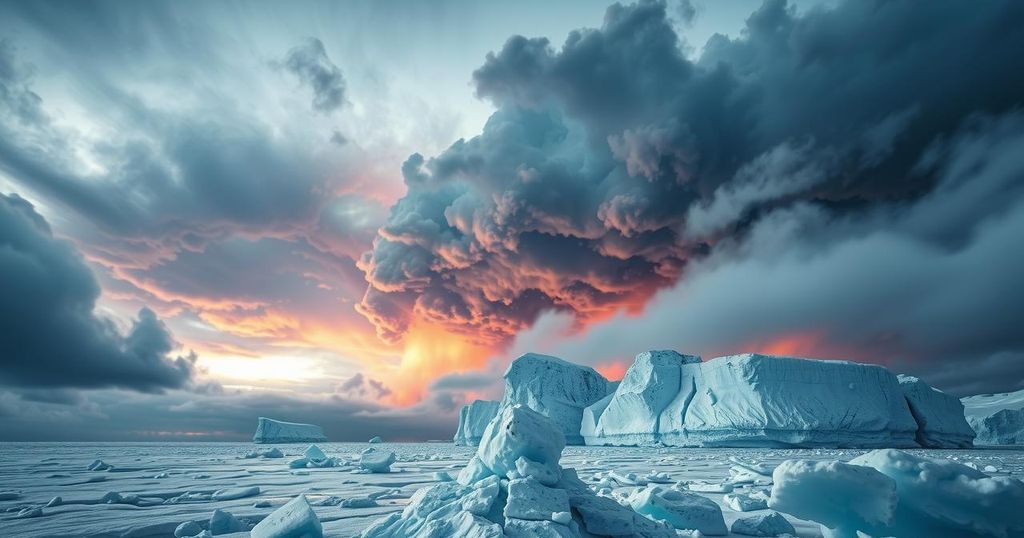Severe Storm Threats in Antarctica: Implications for Global Climate
Antarctica is facing a concerning increase in severe storms due to climate change-induced sea ice loss. As ocean temperatures rise and atmospheric conditions shift, storms become more frequent, posing risks to both Antarctic glaciers and global sea levels. Researchers have observed unprecedented storm activity, highlighting the urgency of understanding these developments and their far-reaching consequences on the climate system.
Antarctica, known for its glaciers and harsh winds, is facing an alarming rise in severe storm events, which not only pose risks to the region itself but also to the global climate. A significant decline in sea ice, attributed to climate change, has resulted in highly turbulent conditions in the Southern Ocean. Researchers indicate that unprecedented changes are occurring in Antarctica’s climate system, with the loss of sea ice potentially exacerbating storm frequency and intensity.
The Southern Ocean’s tumultuous state has coincided with a staggering reduction in sea ice. During the winter of 2023, crucial regions such as the Weddell, Bellingshausen, and Ross Seas recorded sea ice levels plummeting to 80% below normal. This dramatic decline has sent shockwaves throughout Antarctica’s climatic dynamics, illustrating changes not seen for decades.
The escalating storm activity in Antarctica can be traced back predominantly to climate change. As global temperatures rise, the melting glaciers and changing air circulation patterns significantly contribute to the increasing number of storms. Warmer ocean temperatures are intensifying cyclone formation, which threatens to impact the ice-covered continent. Experts have linked the surge in storm frequency directly to atmospheric pressure instability within the Southern Ocean.
Horrific winds approaching 200 km/h, coupled with extreme precipitation and unexpected temperature swings, characterize these storms. The protective sea ice that typically limits heat transfer from the warmer ocean to the frigid atmosphere is diminishing. In consequence, this loss allowed a dramatic release of heat into the atmosphere, accelerating storm formation through rapid air uplift and turbulent weather patterns.
The year 2023 has seen the frequency of storms increase significantly, with certain areas experiencing storm activity nearly seven days per month compared to historical averages. Notably, despite earlier stability in sea ice around Antarctica for nearly four decades, dramatic losses were evident in 2016, culminating in unprecedented levels by 2023, suggesting widespread climatic shifts.
Antarctica serves as a crucial regulator of Earth’s climate. The repercussions of severe storms extend beyond the continent, potentially inducing vast changes in global weather patterns. With the Southern Ocean being central to these developments, scientists are on high alert regarding the increasing storm activity being precipitated by the ongoing climate crisis. The shifting ice landscape is critical, as both loss of ice and the resultant changes in oceanic temperatures usher in significant climate variability on a global scale.
In conclusion, Antarctica’s increasing storm activity due to rapid sea ice loss presents a substantial threat not only to the region but also to the global climate system. The interplay between rising temperatures and atmospheric conditions leads to severe storms that accelerate glacial melting and pose serious implications for global sea levels. As research continues to unveil the magnitude of these changes, it remains critical to monitor their impacts on weather patterns worldwide.
Original Source: newsukraine.rbc.ua




Post Comment